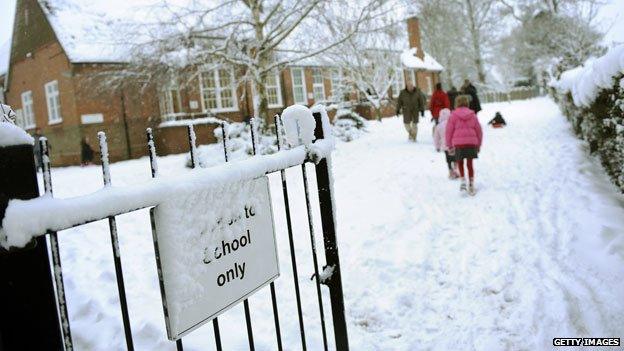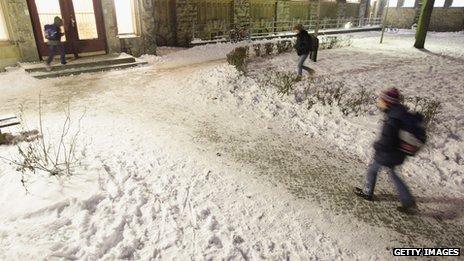10 things about school snow closures
- Published

Nearly 5,000 schools have been closed across the UK as snow and icy conditions continue. Here are 10 things about why schools shut and the impact closures have on parents and the community.
Snow often puts schools on a crash course with parents because of school closures.
In some cases the reason is obvious - snow fall is so heavy no-one is going anywhere. But in other cases, particularly in towns and cities, shops don't shut, offices don't close. Nor do hospitals. So why schools? And what is the impact?
1. Head teachers decide whether to shut a school, as they know their schools and the surrounding areas, says the Department for Education (DfE), which is responsible for schools in England. The advice? "Head teachers should use common sense in assessing the risks and keep their schools open whenever it is safe to do so," it says. In exceptional circumstances a local authority can order a blanket closure of all community and voluntary-controlled schools, but not foundation or voluntary-aided schools or academies, which are more autonomous.

A school stays open in Germany, despite the snow
2. The over-riding decision to close a school is made on the basis of child welfare, according to the National Association of Head Teachers (NAHT). This includes a number of considerations, but focuses on whether children can get to and from school safely, whether the site is safe and whether there are enough staff to supervise youngsters. Health and safety is given a high priority in law, according to Brian Lightman, general secretary of the Association of School and College Leaders (ASCL) so potentially hazardous conditions such as a playground that has turned into an ice-rink or insufficient heating can also be a factor.
3. Staff often travel further to school than children, according to Lightman, so may have more trouble getting in. Schools without enough teachers will sometimes partially open, for example for exam classes such as year 11 or year 13, he says.
4. Situations vary from school to school. On Friday, one local bus company told a school it was unable to provide the school bus home. As it was the main means of transport home for many of the children, the school ended up dismissing classes early, the NAHT says.
5. Parents tend to fall into two categories, according to Lightman. "Some get anxious when it snows and phone the school up because they want their children home straight away. At the other end of the spectrum, parents get frustrated by school closures, and are concerned about childcare arrangements and disruption," he says.
6. People have legal rights to unpaid leave to look after children or other dependents in an emergency, and solicitors advise a school being shut at short notice is likely to be considered an emergency. Employees are entitled to a "reasonable" amount of time off to make alternative arrangements, but what is regarded as "reasonable" depends on individual circumstances, the employment advice and conciliation service Aca notes. TUC policy advisor Paul Sellers says it is "good personnel practice" to have bad weather policies in place but in reality "it's a lottery". "The majority of people who are unable to work due to school closures don't get paid," he says, although the TUC "strongly advises against withholding pay or forcing staff to take holiday". It is possible to get school closure insurance, external.
7. Small businesses are hit harder by school closures than larger companies, as there are fewer members of staff to fill in for those who can't make it into work, according to the Federation of Small Business. National chairman John Walker says 25% of small firms had to close after the heavy snowfall in 2011. "Many for at least five days, costing them up to £5,000," he says. But on the Federation's Facebook page, small business owners say they are doing their best to carry on. "Working from home as my two boys are playing with Lego as their school is shut! I had the wellies at the ready to walk to school too," says Julia AffinityMag.
8. Other countries don't get it. Jessica Ware, of The Local, an English Language news website in Berlin, says heavy snow falls rarely result in German schools being closed because "they are more equipped to deal with it". Schools have been known to close in the summer, however, "because it is too hot". It's a similar sentiment at the Deutsche School, in Richmond, South London. "I am a bit surprised the schools close in the UK at the mention that there might be snow," says its head, Marie Balkenhol. Pupils at the German-speaking school were sent home earlier on Friday, but Mrs Balkenhol says she sees keeping the school open as a top priority - even if it means hiring substitute teachers to fill in for those who cannot make it in. "German parents expect the school to be open and so far we have not closed the school," she says.
9. The contentious issue of school attendance - which is inspected by Ofsted - isn't part of the equation, according to the DfE, which says head teachers should not be worried about the impact that remaining open might have on their attendance statistics. Before 2010, pupils who did not turn up to school in extreme weather had to be marked down as absent, which wasn't the case if the school shut. But the DfE says the department amended regulations in September 2010, allowing the school to use the attendance code Y - which does not affect attendance statistics - when a pupil cannot get in because of severe weather. However if the head teacher believes that a child could have got to school, then the child should be recorded as code O - an unauthorised absence, it says.
10. Exams will go ahead whenever possible, according to the DfE. It says if a head teacher decides to close a school they will discuss alternative arrangements - such as using other nearby public buildings for the exams - with the relevant awarding organisation, and keep parents informed. Contingency plans for exams that have been disrupted will be discussed with the awarding organisations and "action will be taken will aim to safeguard the interests of candidates whilst also maintaining the integrity of the exams", it says. This may involve using evidence of a candidate's likely achievement, or providing the opportunity to sit any missed exam later in the year.